May 27, 2024 other-professional-development
Math Survey Questions for Teachers – Evaluation Forms for Principals and Coaches
By: Jeff Todd
Discover three ways that principals and math coaches can get feedback from mathematics teachers and start a dialogue. In this article, we will be looking at math survey questions for teachers, principal evaluation forms for teachers, and conversation prompts. In addition, you will find free printable teacher feedback surveys that can be used to survey teaching departments and curriculum/school evaluation forms that can be used by principals and coaches to survey a variety of educational stakeholders.
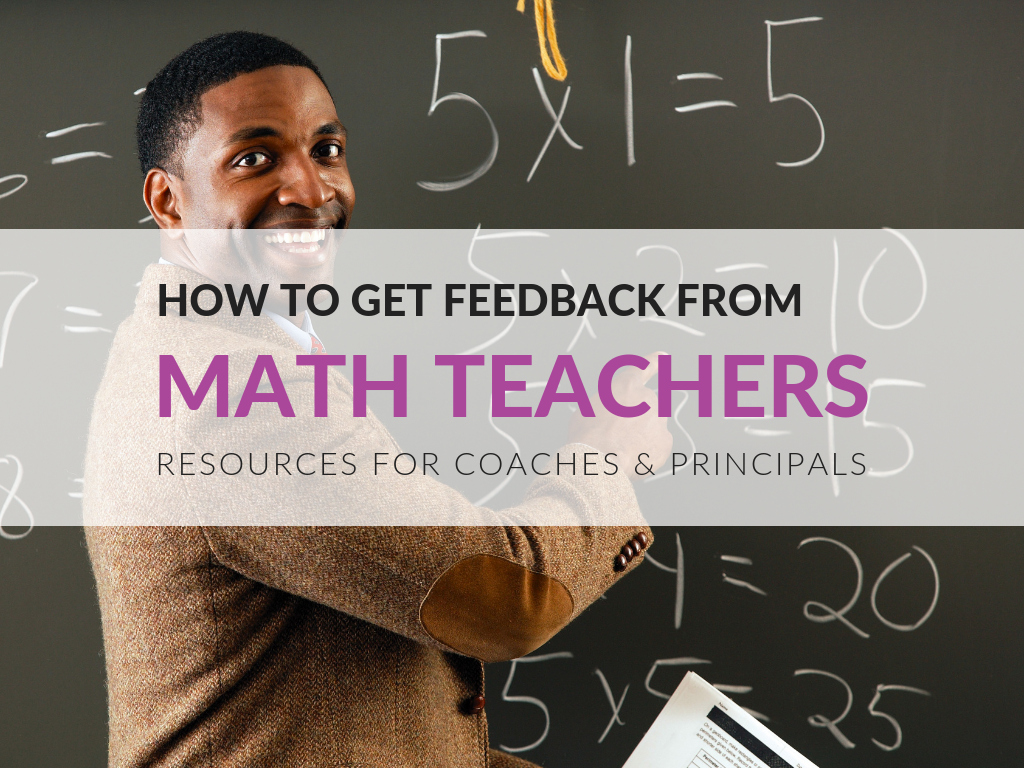
Promote the Development of a Professional Culture Among Your Math Team
Some states mandate that school leaders gather input on their performance from teachers, students, parents, and other community members. Some leaders do this on their own for professional growth. Feedback is critical for every employee at every level. We all need an honest assessment of our job performance.
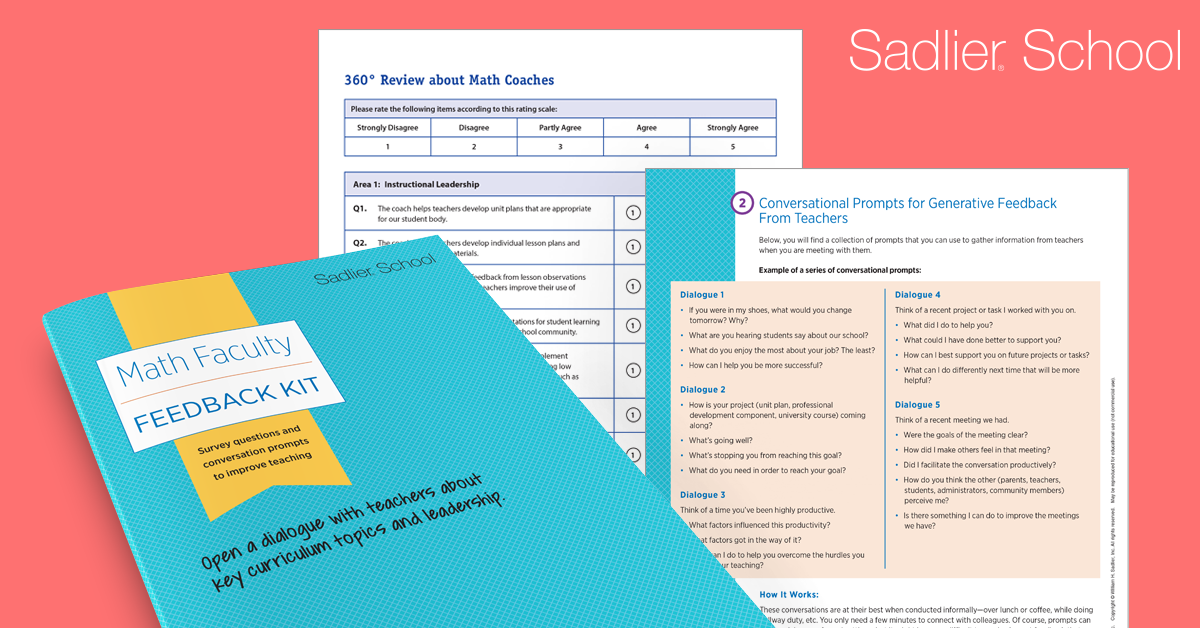
The Math Faculty Feedback Kit offers three ways that principals and math coaches can get feedback from math teachers and start a dialogue. Whether you use this kit as part of a formal evaluation or informally, the methods and surveys provided can help you as a principal or math coach. In seeking the input of those you work with most closely, you’ll gain a greater understanding of your strengths and weaknesses.
In the Math Faculty Feedback Kit, are three resources that can be used to get feedback from math teachers:
- Math Survey about Curriculum and Leadership
- Conversational Prompts
- 360º Review for Math Coaches
Below you'll find more information on how these three resources elicit constructive feedback from math teachers about their leaders, culture, and math program.
3 Ways to Get Feedback From Math Teachers
Math Survey Questions for Teachers about Curriculum & Leadership
Whether you are a new coach or principal or trying to avoid stagnation and promote a fresh perspective on your leadership, surveying all of the teachers in the math department is a good way to start. Establishing the idea that you want and appreciate input sets a tone that will promote further openness and feedback.
The math survey questions I have for teachers would ideally be used after several months of working together, as they (the teachers) need to have some knowledge of what it is like to work with you.
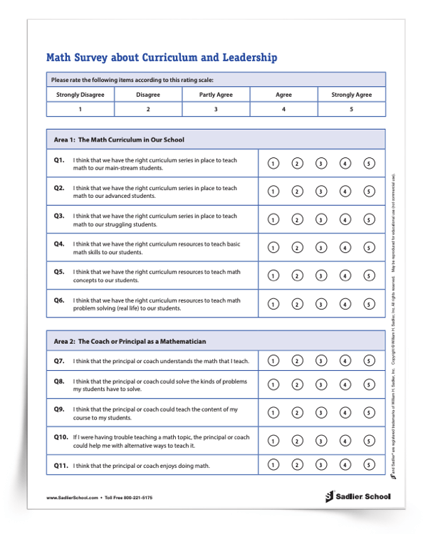
HOW IT WORKS:
The Math Teacher Survey about Curriculum and Leadership is intended to:
- Solicit feedback from math teachers about math curriculum
- Assess the principal's or coach’s mathematical knowledge
- Reflect on the nature of interactions with the principal or coach
- Consider how math is taught in your school
Giving this survey online would be efficient, but a simple paper and pencil exercise as part of a team meeting or a professional development day is also effective. You simply distribute the survey, provide a faculty member with an envelope, and leave the room while the survey is completed, which takes approximately 10 minutes.
After you have collected the surveys and analyzed the data, it is critical that you promptly share the results of the survey with the math teachers. Even if the data isn't always flattering, your openness and transparency about their responses will show how you want them to respond to student test results or to surveys that they might give on their own.
Next, tell teachers how you are creating a plan to respond to their evaluation of your work but will need their input. For instance: “I see from the surveys that teachers may not be comfortable bringing up difficult topics with me. How can I make you more comfortable about saying what is really on your mind?” Offer some ideas, give them a way to respond, take their suggestions, and follow up on a plan. Your leadership in establishing a culture of response to data will model what you expect to see from them.
Conversational Prompts for Generative Feedback From Teachers
In the Math Faculty Feedback Kit, you will find a collection of prompts that you can use to gather feedback from teachers when you are meeting with them.
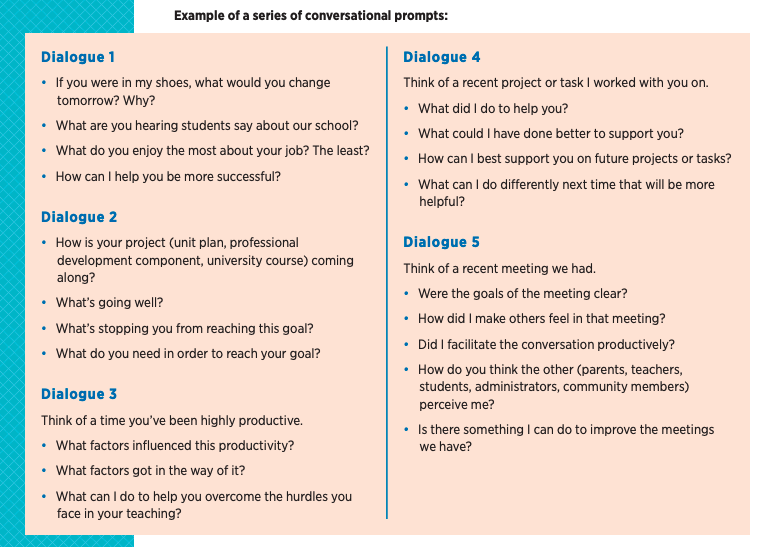
HOW IT WORKS:
These conversations are at their best when conducted informally—over lunch or coffee, while doing hallway duty, etc. You only need a few minutes to connect with colleagues. Of course, prompts can also work in more formal settings, but it might be more difficult to receive honest feedback that way.
When you receive feedback from teachers in this way, be aware of your reactions. Always thank them, let them know that what they say is important, and tell them what you will do to respond to it even if it is thinking further. Don’t assume at first that their responses are 100% honest. You are working to build an open, honest relationship. You might think they are totally off base, but you also have a different perspective.
If you find discontentment or disagreement, ask yourself why teachers might be in such a different place on a specific topic and discuss. This lets your staff know that you’re aware of this situation and provide them with an opportunity to enlighten you.
Whether you believe that an employee’s frustrations are warranted or not, it’s better to know why discontent is breeding than to dismiss or misunderstand it.
360 Degree Review Survey for Math Coaches
Different from the Math Survey provided first in this kit, which would go to a whole department, the 360° Review Survey about Math Coaches seeks input from a variety of sources. 360° Reviews are commonly used in a variety of work settings to get a better understanding of a person’s performance based on many colleagues’ feedback, not just a manager’s.
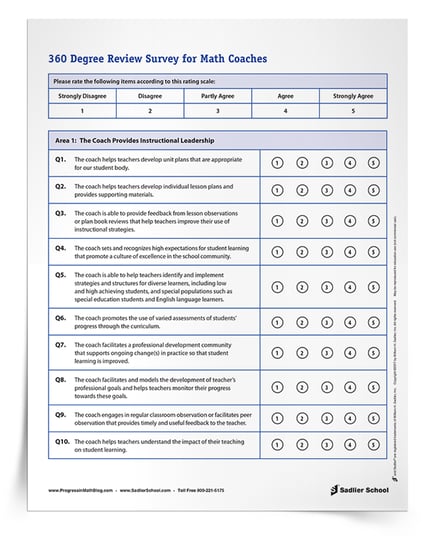
HOW IT WORKS:
The 360° Review Survey about Math Coaches can be used by a math coach, math specialist, or math supervisor to receive feedback.
You might choose a few different teachers from different grade levels, paraprofessionals, principals, vice principals, central office administrators, and even parents or community members who collaborate with the school in some way. The goal is not to survey too many people. A few key people who work with you often, carefully chosen, will give you a feel for what people think about your work and interactions with them.
The people who complete the 360° Review Survey about Math Coaches are going to want anonymity to be honest with you. For this reason, it is common for someone besides you to collect the surveys and compile the results.
The results should be totaled and summarized. Looking at the results from teachers and administrators will provide useful information.
The results of a 360° Review Survey about Math Coaches process can be challenging. If you embark on one, be prepared! Our own perceptions of our strengths and weaknesses can be quite different from those of our colleagues. That’s why getting their honest opinion is so important.
In Summary
Completing surveys like these and discussing the results models a reflective practice that helps math teachers see how their input can result in real change and create a work culture that is positive, productive, and focused on results. This practice can extend beyond the present and create a foundation for future leaders.



